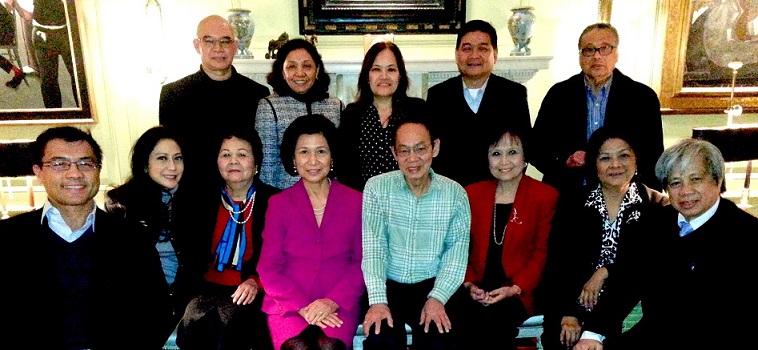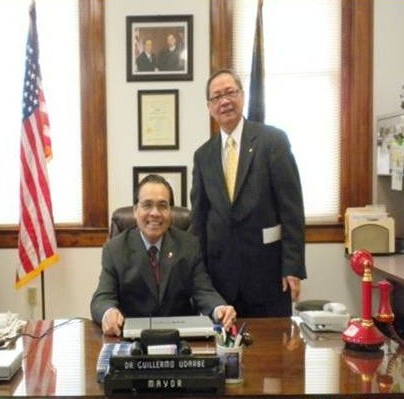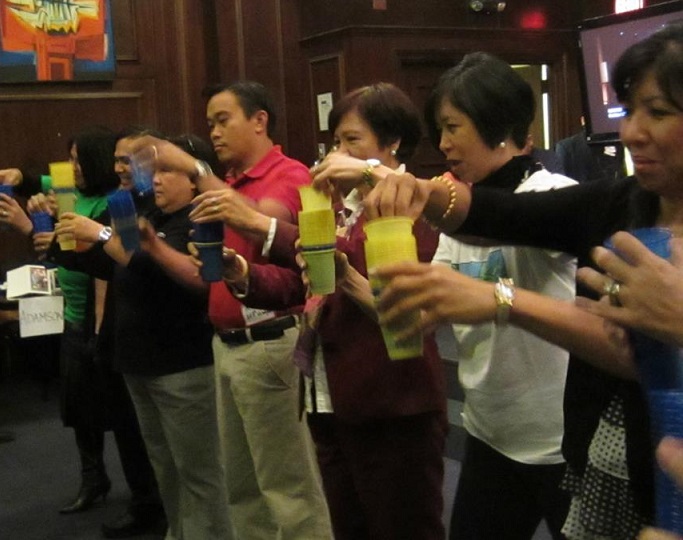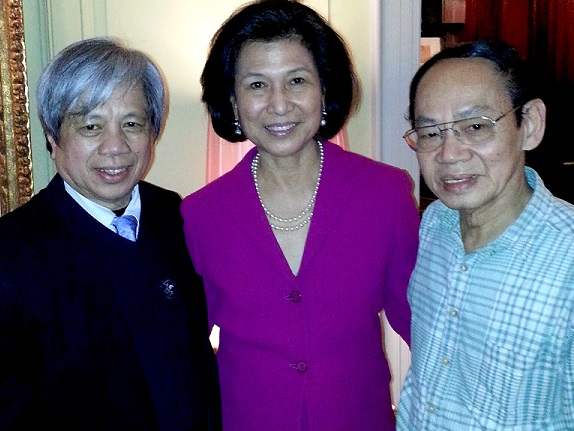Investors, advocates pledge support for production of ‘Noli’ opera
By Randy GenerThe opera “Noli Me Tangere” has edged one step closer to the American mainstream with organizers and advocates of the arts in the pledging to do their part to invest funds and raise public awareness for its highly anticipated New York premiere.
“Lovers of Philippine culture would have heard of Rizal’s classic novel,” said industrialist Loida Lewis, the project’s lead producer. “When they hear the ‘Noli’ opera sung in the Filipino language, Filipino Americans everywhere will be curious and amazed that this masterpiece could be presented in New York.”
As the guest of honor at a dinner hosted by Lewis at her Fifth Avenue residence, Bayani de Leon told boyhood stories about growing up with a legendary father whose original music compositions celebrated the deepest meanings of significant events and symbols in Philippine history. He stated that his father’s affinity with Philippine folk culture was the foundation of a passionate Filipino nationalism, which he articulated through music. After dessert, the guests retired to the living room. Michael Dadap, music director of the “Noli” staging and Bayani’s childhood friend, entertained the guests by performing his own guitar arrangements of two kundiman songs written by Felipe de Leon.
“Noli Me Tangere: The Opera” performs October 4 to 6 at the Sylvia and Danny Kaye Playhouse at Hunter College. What’s at stake goes far beyond ensuring the success of this stage production. What ultimately matters, the dinner guests agreed, is the sustainability of Philippine arts and culture in an increasingly global landscape: Can we promote and sustain the arts and culture we have created? How do we U.S. Filipinos and Filipino Americans build, cultivate and engage passionate communities that will rally for arts and culture over materialism — for the perpetuation of Philippine art forms and musical literature that transcend language barriers?
If given the right level of support, the East Coast premiere of the “Noli” opera could serve as a model for the globalization of Philippine classical music and theatrical performance. “Production members of the opera are fully engaged in making it a successful show,” said Stephanie Francine Osmeña, real-estate associate of Larry Kaiser Key Ventures. “They are each one extremely talented. By producing the ‘Noli,’ they are unknowingly uniting Pinoys and enforcing our sense of national pride and history.”
Edwin Josue, of Halstead Property, agreed. “Staging the ‘Noli’ opera in New York will showcase to the world that we Filipinos, lovers of theater and arts, can contribute to our nation’s heritage and culture.”
“It is always an honor for me to be a part of promoting our Philippine arts and culture through music and dance,” said Nerissa Abadilla, wife of Philippine Ambassador Ariel Abadilla who represented the Bayanihan USA Alumni Association. “I will definitely spread the word and help in any way I can.”
“This ‘Noli’ production will have a tremendous cultural impact on U.S. Pinoys in Connecticut, especially since we have three chapters of the Order of the Knights of Rizal here,” said Dr. Edgardo Ragaza, a cardiologist from Branford, Connecticut. “We are excited about this opera.”
In fact Dr. Ragaza and his wife, the internist Dr. Aleflor Gamo Ragaza, have committed to bring two busloads of people to attend a Sunday matinee performance.
Since its 1957 debut, the “Noli” opera has never been produced in New York. Ironically it is considered the most performed Filipino opera, having been staged more than 25 times in the Philippines and abroad. The Foundation for Filipino Artists, led by executive director Aida Bartolome, has scheduled the opera for the Filipino-American History Month of October; it is the centerpiece of the nonprofit advocacy’s 25th anniversary year of promoting Philippine arts and culture in New York.

Seated, left to right: Randy Gener, Stephanie Francine Osmeña, Aida Bartolome, Loida Nicolas Lewis, Bayani de Leon, Aleflor Gamo Ragaza, Angie Cruz, and Michael Dadap. Standing, left to right: Jerry Sibal, New York event designer; Nerissa Abadilla, Nanette Sering Wright, Edwin Josue, and Dr. Edgardo Ragaza. Photos courtesy of Edwin Josue.
Those who invest in the opera are, in essence, taking part in a piece of classical-music-history-in-the-making. The fundraising dinner at Lewis’ residence has attracted Gail Alvarez, a philanthropist, and her husband Tony Alvarez of the global professional services firm Alvarez & Marsal; Angie Cruz, founder/president of the Institute for Spirituality in the Workplace and board member of Filipino American Legal Defense & Education Fund; Jerry Sibal, a New York event designer; and Nanette Sering Wright, San Lorenzo Ruiz Chapel Board of Adviser. L. M. Reyes Wiesel, a family friend, hosted Bayani de Leon during his New York visit.
“It was the first time I met Bayani,” recalls Dr. Ragaza, who along with his wife convenes the Connecticut chapter of the U.S. Pinoys for Good Governance. “I am impressed with Bayani’s knowledge about Philippine music and the arts — and with his still-lucid memories and the pearls of wisdom he received from his late father, which guide him in his journey through life.”
The evening struck a personal chord with Stephanie Osmeña, whose great grandfather was the fourth Philippine President Sergio Osmeña. “My general impression of Bayani is one of deep admiration,” she said. “He is simply a genius at manifesting music patterns, which to an ordinary ear would simply go unnoticed. To be in the presence of the son who follows so unreservedly and remarkably in his father’s footsteps is, for me, such a humbling experience. The ‘Noli’ rekindles the desire in us, whether here or abroad, to treasure our Filipino traditions.”
“Noli Me Tangere: The Opera” is not just a Filipino event. “It is a human interest story that reflects all our hopes and dreams,” said Gerardo Gaddi, one of the opera’s New York producers. “It is the coming together of a people who have a common interest to promote our rich musical heritage to the mainstream. If we pull our resources together, no matter how big or small, we are all in this journey together as a unified people that represent what it means to be global citizens who promote diversity through the arts.”
Randy Gener, a New York editor, writer and artist, is the production dramaturge of “Noli Me Tangere: The Opera” and the curator/organizer of Filipino Mundo-NYC, a Meetup group of young professionals and visual/performing artists.
 Trust our award-winning law firm with your immigration case.
Trust our award-winning law firm with your immigration case.
Katamisán Cakes: French technique, tropical flavors. Weddings & special events. Click for info.













